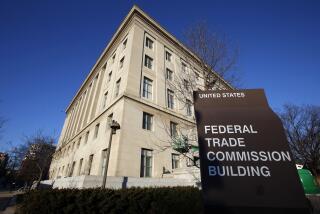FCC Considers Limits on Foreign Phone Equipment
- Share via
WASHINGTON — The chairman of the Federal Communications Commission said Wednesday that the agency is investigating the possibility of implementing regulations that could block American telephone companies from buying foreign switching equipment.
Mark S. Fowler said a proposed rule could be ready for public comment by the end of the year. The move is the newest phase of an intense multibillion-dollar trade battle with West Germany.
Fowler is upset that foreign companies can do business in the United States while foreign governments, such as West Germany, seek to block American companies from selling such equipment abroad.
The proposed rule, he said, would let the FCC take into account questions of national security as well as fair and free trade in deciding whether it is in the public interest to allow a piece of foreign equipment to be used in the American telephone network.
In an interview, Fowler said it might not be wise to allow foreign manufacturers to know how and where sophisticated switching equipment is installed and how well it is protected.
Siemens AG, the West German company at the center of the fight, has gained a toehold in the American telephone market since 1984, when American Telephone & Telegraph lost its monopoly to make equipment for all of the Bell telephone companies it owned.
AT&T; still gets most orders, but Siemens, with U.S. headquarters in Boca Raton, Fla., and Canadian-owned Northern Telecom Ltd. have signed some contracts. Northern Telecom’s U.S. subsidiary is based in Nashville, Tenn.
Fowler has said he is outraged by West German efforts to keep AT&T; from closing a lucrative contract to obtain 16% of the digital switching equipment business of the state-owned French telephone system.
West German officials said the French should keep the business in Europe and deal with Siemens, not AT&T.;
The FCC chairman threatened U.S. government sanctions against Japanese companies in January, 1985, by inquiring publicly into whether he could slow down approval for Japanese products in retaliation for delayed approval of American equipment offered to Japan. After a seven-month study, the commission decided that it lacked authority to act.
Under a 1981 trade agreement that expires Dec. 31, Japan and the United States are supposed to have access to each other’s markets. However, American sales to Japan have been generally disappointing.
American-made products are less expensive in Japan, however, since the value of the dollar has declined in relationship to the yen.






